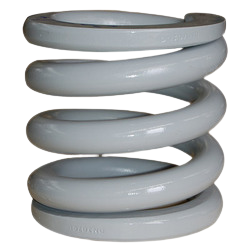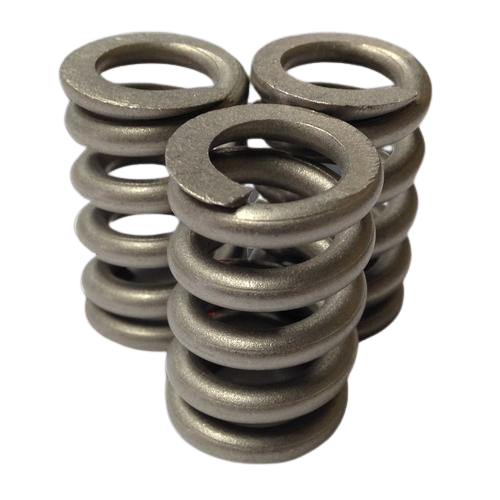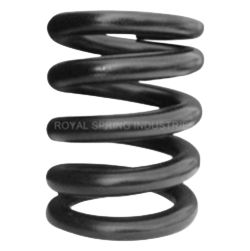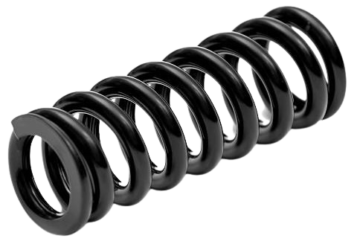Coil Spring




Coil Spring manufacturers :
We are leading Coil Spring manufacturers up to the manufacturing capacity :
- Wire Dia. : upto 70 mm.
- Outer Dia. : upto 500 mm.
- Free Height : upto 1000 mm.
- Total Coils : As per user’s requirement.
- Load capacity : upto 40 Tons. (per pc.)
Raw-material grades :
Coil Spring is made from high-strength Spring Steels selected based on load, fatigue life, environment and manufacturing method (cold-coiled vs hot-coiled). Below is a clear breakdown of the Raw material grades commonly used worldwide :
- BS:970 EN-42
- BS:970 EN-45
- BS:970 EN-47
- 50Cr.V4
- 50Cr.4V2
- 51Cr.V4
- 50Cr.MoV4
- 50Si7
- 55Si7
- 60Si7
- SUP-9
- SUP-9A
- SAE-5160
- IS:4454 Part-1 Grade-2
- IS:4454 Part-1 Grade-2D
- Stainless Steel
- others similar foreign grades JIS, ASTM etc.
Painting & Coating :
Coil Spring is painted or coated mainly to prevent corrosion, improve fatigue life, and enhance appearance. The coating system is selected based on environment, durability requirement and cost. Below is a clear industry-standard breakdown of painting and coating methods used after Coil Spring made :
- Synthetic Enamel Paint
- Powder Coating
- Phosphate
- Zinc Coating
- etc.
Manufacturing process (flow chart) :
Below is a step-by-step, industry-standard Coil Spring manufacturing process, covering both cold-coiled and hot-coiled Springs. This is the process used by most Automotive, Machinery and Railway Coil Spring manufacturers :
- Raw material procurement
- Raw material dimension checking
- Raw material Chemical testing
- Centre Less grinding
- Both ends Forging
- Bar heating in furnace at approx. 950º C
- Coiling on coiling pitching machine
- Oil quenching for Hardening
- Tempering in furnace at approx. 450º C
- Scrag testing
- Height checking
- Ends grinding
- Dimension checking
- Load testing
- Shot peening
- Surface oiling
- Painting
- Coating
- Packing
- Delivery
What is a Coil Spring ?
Coil Spring is essential components in a variety of mechanical systems, designed to store and release energy through the principles of elasticity. This is a mechanical device made of a flexible material, typically metal, wound into a helical shape. This configuration allows the Spring to compress or extend under an applied load, aiding in the absorption of shock and the reduction of vibrations across numerous applications.
The fundamental operation of Coil Spring is rooted in the physical concept of elasticity, which is the ability of a material to return to its original shape after being deformed. When a force is applied, the Coil Spring undergoes deformation, resulting in the storage of potential energy. This stored energy is subsequently released when the force is removed, allowing the Coil Spring to return to its resting position.
Coil Spring comes in various types, each tailored for specific applications. For instance, Compression Spring, Tension Spring and Torsion Spring serve different purposes yet fundamentally operate under the same principles of elasticity and energy storage.
Types :
Compression Springs : This Coil Spring types are designed to resist axial loads when compressed. These Springs are typically coiled tightly and possess a helical shape. When a load is applied, the Spring compresses, storing potential energy, which is released when the load is removed. They are widely used in automotive suspension systems, electronic devices and various machinery, providing support and absorbing shocks for a smoother operation.
Extension Springs : This Coil Spring types are engineered to absorb and store energy when being stretched. Unlike Compression Springs, they are coiled in a way that allows them to extend under tensile loads. The most common features of these Springs include hooks or loops at both ends for attachment. They are commonly utilized in applications like garage door mechanisms, trampolines, and certain types of playground equipment.
Torsion Springs : This Coil Spring types are characterized by their ability to twist and store energy when subjected to torque. These Springs are designed to operate rotationally rather than linearly, which allows them to maintain force when twisted. These Springs can be found in applications such as clothespins, rotating toys, and various machinery that requires rotational power.
Design :
The Coil Spring design is a crucial element in ensuring their efficient performance and longevity in various applications. A fundamental aspect of this Spring design involves accurate load calculations. Understanding the load requirements, including static and dynamic loads, is essential to determine the proper specifications of the Spring. Incorrect load assessments can lead to premature failure or inadequate performance, making precise calculations imperative.
Another significant consideration in Coil Spring design is Spring’s dimensions, which encompass wire diameter, coil diameter and overall length. These dimensions dictate the Spring’s stiffness and deflection properties. A larger coil diameter generally results in increased deflection under load, while wire diameter impacts both strength and flexibility. It is essential to align these dimensions with the intended application to ensure optimal performance.
Coil pitch or the spacing between each coil, is also plays a vital role in the Coil Spring design process. Adequate coil pitch allows for smooth operation and minimizes friction between the coils, thus enhancing the Coil Spring’s lifespan. Conversely, insufficient spacing can lead to coil binding, affecting the performance negatively. Achieving the right balance in coil pitch according to the Spring’s operational environment is necessary for reliable functioning.
Tolerance levels are equally important in the Coil Spring design. Ensuring precise tolerances during production minimizes variability and ensures that the Coil Spring can perform as designed. Tight tolerances help maintain consistency in performance, while loose tolerances may result in a subpar product that does not meet performance expectations.
Application / uses :
Railway : Coil Spring used in Railway Bogie / Wagon are critical safety components designed to carry very high loads, absorb shocks and withstand millions of fatigue cycles under harsh outdoor conditions. Railway Bogies typically use Coil Springs for Primary suspension (between axle box & bogie frame) and Secondary suspension (between bogie frame & car body). They work together with dampers and rubber elements to absorb track irregularities, reduce vibration, maintain wheel–rail contact and to improve ride comfort & safety.
Automobile : Coil Spring used in Automobile suspension systems are critical safety and performance components. They support vehicle weight, absorb road shocks and maintain tire contact with the road. Coil Springs are used in MacPherson strut suspension, double wishbone suspension and multi-link rear suspension. They carry static & dynamic vehicle load, absorb bumps & vibrations, maintain ride height, improve handling and comfort.
Heavy machinery : Coil Spring used in heavy-duty machinery are designed for very high loads, shock absorption, and long fatigue life under harsh operating conditions (dust, heat, vibration, corrosion). The are used in Mining & earth-moving equipment, Crushers & vibrating screens, Construction machinery, Presses & forging machines, Industrial shock absorbers, Heavy clutches & brakes, Oil & gas equipment, Railway & port machinery etc.
What are Heavy Duty Coil Springs ?
Heavy duty Coil Springs are specifically engineered to withstand demanding conditions, providing optimal performance and durability. The primary characteristic that distinguishes a heavy duty Coil Springs from a standard one is the material used in its construction. High-carbon steel and alloy steel are commonly utilized due to their ability to endure significant stress and maintain shape under continuous load.
Specification :
A critical factor is it’s wire diameter. Heavy duty Coil Springs are typically feature a larger wire diameter, which increases the Spring’s load capacity and resistance to deformation. A thicker wire provides added strength, enabling the Coil Spring to absorb more energy and return to its original shape without yielding. The increased wire diameter also plays a crucial role in minimizing the risk of fatigue, ensuring a longer lifespan even under severe conditions.
Spring rates, defined as the amount of force needed to compress the Spring a certain distance, are an essential aspect as well. Heavy duty Coil Springs are designed with higher Spring rates, making them capable of handling increased loads with minimal deflection. This feature contributes significantly to vehicle stability, ensuring that heavy loads do not lead to excessive sagging or deviation from optimal alignment.
Load capacities are another determining factor in defining heavy duty Coil Springs. These Springs are designed to accommodate substantial weight without compromising performance. By utilizing advanced engineering techniques, manufacturers can create Coil Springs that not only support higher loads but also maintain their functional characteristics over time.
Application :
Heavy duty Coil Springs are used in components for variety of industries, serving critical roles in applications that require enhanced strength and load-bearing capabilities. One of the most prominent uses of these robust Coil Springs is found in Automotive suspension systems. In this context, heavy duty Coil Springs are designed to support the weight of vehicles while also absorbing shocks caused by uneven terrains.
Beyond Automotive applications, heavy duty Coil Springs also play a vital role in machinery such as Excavators, Bulldozers and Cranes often face extreme loads and dynamic forces, necessitating components capable of withstanding considerable stress. The robust construction of heavy duty Coil Springs allow them to effectively manage these forces, providing stability and resilience to the machinery.
Heavy duty Coil Springs application in various other sectors, including aerospace, industrial machinery and even recreational vehicles. In aerospace, these Springs are utilized in landing gear systems, where they are instrumental in absorbing landing impact forces. In industrial machinery, heavy duty Coil Springs contribute to equipment performance, reducing vibrations and enhancing durability.
Benefits :
Heavy duty Coil Springs offer advantages that significantly enhance the performance and durability of various vehicles and machinery. One of the primary benefit is improved stability. The robust design of these Coil Springs allows for better weight distribution, which is essential when a vehicle is loaded. This increased stability ensures that vehicles handle better, especially when navigating rough terrains or during sharp turns, thereby improving the safety and comfort of passengers and operators alike.
Another essential heavy duty Coil Springs benefit is their increased load capacity. Designed to withstand substantial weight, these Coil Springs are ideal for heavy-duty applications such as trucks and construction equipment. They can bear greater loads without compromising their structural integrity, thereby preventing potential failure during demanding operations.
Additionally, heavy duty Coil Springs contribute to reduced wear and tear of both these Springs themselves and the surrounding components. Their sturdy construction helps them withstand extreme conditions without bending or breaking, which can often lead to costly repairs.
Installation and maintenance :
Heavy duty Coil Springs installation requires precision and adherence to best practices to guarantee optimal performance and safety. The installation process begins with the necessary preparations, which include gathering appropriate tools such as a jack, jack stands and Spring compressors. It is also essential to consult the vehicle’s service manual to understand specific requirements for the model in question.
Step one involves safely lifting the vehicle using the jack and securing it with jack stands. Next, the wheels must be removed to gain access to the suspension components. The existing heavy duty Coil Springs, if any, should be carefully detached from the suspension system, ensuring that all bolts and nuts are removed as per the specifications provided in the service manual.
Once the old Springs are removed, the new heavy duty Coil Springs can be installed. It is vital to align the Springs correctly, ensuring they sit properly in the Coil Spring seats. Reinstall the suspension components and ensure all nuts and bolts are tightened to the manufacturer’s torque specifications. After installation, do a thorough inspection to confirm everything is secured before lowering the vehicle back to the ground.
Maintenance is equally important for heavy duty Coil Springs to extend their lifespan and maintain performance. Regular inspections are recommended to identify any signs of wear or damage, such as rust or corrosion. Cleaning the Springs periodically helps prevent debris accumulation that can affect performance.
